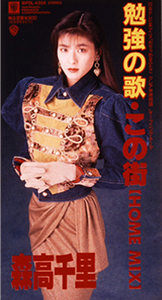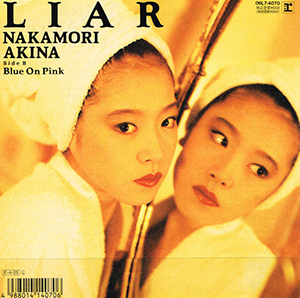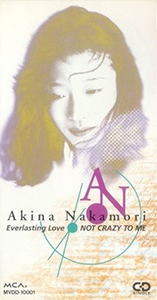Related Research Articles
The discography of the Japanese girl group Morning Musume consists of sixteen studio albums, five compilation albums, and seventy singles. Ever since its establishment in 1997, the group has experienced frequent line-up changes, and currently consists of twelve members: Mizuki Fukumura (leader), Erina Ikuta (sub-leader), Ayumi Ishida (sub-leader), Sakura Oda, Miki Nonaka, Maria Makino, Akane Haga, Reina Yokoyama, Rio Kitagawa, Homare Okamura, Mei Yamazaki and Rio Sakurai. The group was formed by Sharam Q vocalist Tsunku, who serves as their lyricist, composer, and producer.
Hideaki Tokunaga is a Japanese pop singer-songwriter and actor.
The Japanese boy band Kanjani Eight is a pop idol group managed by Johnny & Associates and works released by Infinity Records. The group, currently, has a total of 36 released singles, 9 studio albums, one mini album, and fifteen DVD releases. Thirty three of thirty six singles have placed at number-one on the Oricon singles chart. 47, the concert DVD for their 2007 nationwide tour, was the top selling music DVD of 2008.
Manish were a Japanese power-pop band formed in 1992 by vocalist and lyricist, Misuzu Takahashi and composer and keyboardist, Mari Nishimoto. The band's name comes from spelling member name MA(ri)NISH(imoto). Manish disbanded in 1998.
Japanese singer Shizuka Kudo has released eighteen studio albums, fourteen compilation albums, one EP, two cover albums, six video albums, twelve live video albums, two box sets, and forty-three singles. Her career began in 1985 when she debuted as one of the three vocalists of the girl group Seventeen Club. The short-lived group disbanded after two unsuccessful singles. In 1986, she joined the idol girl group Onyanko Club as member number 38, which led to Kudo forming the subgroup Ushirogami Hikaretai the following year. She released her first solo single, "Kindan no Telepathy", on the same day as the last broadcast of the variety show Yūyake Nyan Nyan, from which the Onyanko Club members originated. It debuted at number one on the Oricon Singles Chart and became the first of eleven total number-one singles released in the late 1980s and early 1990s, including "Koi Hitoyo", "Arashi no Sugao", "Kuchibiru Kara Biyaku", "Senryū no Shizuku" and "Please". Miyuki Nakajima penned the following singles released by Kudo during this era: "Fu-ji-tsu", "Mugon... Iroppoi", "Kōsa ni Fukarete", "Watashi ni Tsuite" and Dōkoku". All five singles debuted at number one and, with total sales exceeding a million, "Dōkoku" became the best-selling single of Kudo's career.
The following is the discography of hide, a Japanese rock musician who first gained fame in the late 1980s as lead guitarist of the heavy metal band X Japan before starting his solo career in 1993. Prior to X Japan, hide was leader and guitarist of the heavy metal band Saber Tiger, who released one self-titled EP in July 1985 and contributed to two omnibuses before ending activities. Although two compilation albums of demos and live recordings and one concert VHS would later be released in 2001, with the band credited as Yokosuka Saver Tiger.

Realize is the fifth studio album by Japanese singer/songwriter Hideaki Tokunaga. Released on May 21, 1989, the album sold over 300,000 copies and peaked at No. 4 in Oricon's albums chart and was ranked at No. 46 in Oricon's 1989 year-ending album chart. It was also certified Gold by the RIAJ.

"Benkyō no Uta" is the 12th single by Japanese singer/songwriter Chisato Moritaka. The lyrics were written by Moritaka and the music was composed by Hideo Saitō, the single was released alongside "Kono Machi " by Warner Pioneer on February 10, 1991. The song was used as the opening theme of the 1991 anime TV series Mischievous Twins: The Tales of St. Clare's.
The discography of the Japanese singer/songwriter Yōko Oginome consists of seventeen studio albums, nine compilation albums, and forty one singles released since 1984.

Collection II is the third compilation album by Japanese entertainer Miho Nakayama. Released through King Records on November 21, 1990, the album compiles Nakayama's singles from 1988 to 1990, plus the new song "I Can't Follow You".

Miho's Select is the fourth compilation album by Japanese entertainer Miho Nakayama. Released through King Records on December 24, 1991, the album features re-recordings of Nakayama's personal selection of eight of her past songs, plus the singles "Rosa" and "Tōi Machi no Doko ka de..." The photos in the album were taken from the Wani Books photo book Scena: Miho Nakayama Pictorial.

"Sekaijū no Dare Yori Kitto" is the 25th single by Japanese entertainer Miho Nakayama and a collaboration with the band Wands. Written by Show Wesugi, Nakayama, and Tetsurō Oda, the single was released on October 28, 1992, by King Records.

"Liar" is the 23rd single by Japanese entertainer Akina Nakamori. Written by Mitsuko Shiramine and Kazuya Izumi, the single was released on April 25, 1989, by Warner Pioneer through the Reprise label. It was also the lead single from her 14th studio album Cruise.

"Dear Friend" is the 24th single by Japanese entertainer Akina Nakamori. Written by Mayumi Itō and Kazuya Izumi, the single was released on July 17, 1990, by Warner Pioneer through the Reprise label. It was also the lead single from her fifth compilation album Best III.

"Mizu ni Sashita Hana" is the 25th single by Japanese entertainer Akina Nakamori. Written by Natsumi Tadano and Junko Hirotani, the single was released on November 6, 1990, by Warner Pioneer through the Reprise label. It was also the second single from her fifth compilation album Best III.

"Futari Shizuka: Tenkawa Densetsu Satsujin Jiken yori" is the 26th single by Japanese entertainer Akina Nakamori. Written by Takashi Matsumoto and Makoto Sekiguchi, the single was released on March 25, 1991, by Warner Pioneer through the Reprise label. It was also the third single from her fifth compilation album Best III. This was Nakamori's final release under Warner Pioneer.

"Everlasting Love" is the 27th single by Japanese entertainer Akina Nakamori. Written by Taeko Onuki and Ryuichi Sakamoto, the song was released as a double-A single with "Not Crazy to Me" on May 21, 1993, by MCA Victor. It was also the lead single from her sixth compilation album Lyricism: Ballad Collection.

"Gekka" is the 30th single by Japanese entertainer Akina Nakamori. Written by Gorō Matsui and Shūgō Kajiwara, the single was released on October 5, 1994, by MCA Victor.

"Moonlight Shadow: Tsuki ni Hoero" is the 33rd single by Japanese entertainer Akina Nakamori. Written by Toshihiko Takamizawa and Tetsuya Komuro, the single was released on August 7, 1996, by MCA Victor. It was also the lead single from her 17th studio album Shaker.
References
- 1 2 3 4 5 6 "徳永英明" (in Japanese). Oricon . Retrieved 2020-10-05.
- 1 2 3 4 5 "徳永英明". Yamachan Land (in Japanese). Archived from the original on 2011-08-14. Retrieved 2021-08-15.
- 1 2 3 4 5 6 "ゴールドディスク認定" (in Japanese). Recording Industry Association of Japan . Retrieved 2020-10-05.
- ↑ "ミリオン認定数推移 (Select 2010年 on the drop-down menu)". RIAJ . Retrieved 2021-08-24.
- ↑ "ミリオン認定数推移 (Select 2008年 on the drop-down menu)". RIAJ . Retrieved 2021-08-24.
- ↑ "徳永英明(シングル)". Yamachan Land (in Japanese). Archived from the original on 2011-05-24. Retrieved 2021-08-15.